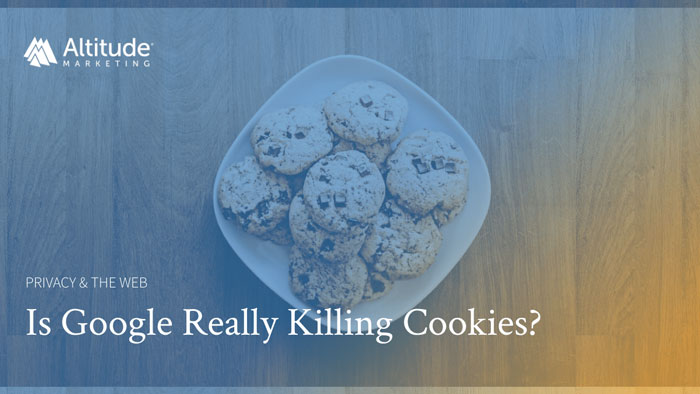Jan. 1, 2022 will be here faster than you think. That’s the date that Google is supposedly “killing cookies.” But is that really what’s happening?
Back in 2020, Google announced that it would be increasing its efforts to enhance user privacy. This will effectively cut back on the user targeting and trackers available for use on their platforms. While pro-privacy efforts are usually met with great enthusiasm, this announcement left some marketers worried about the future of cookies.
First Things First: Time to Dispel the Rumors …
The burning question we are all here for: Is Google really killing cookies?
The short answer? No, not at all.
In the months leading up to 2022, Google will begin releasing changes to Google Chrome so it no longer supports third-party cookies. First-party cookies, however, will remain unaffected.

What Are Cookies?
As you can probably tell, we aren’t talking about the chocolate chip variety. (Or oatmeal raisin, if you’re into that.) So, let’s backtrack a little.
Internet cookies are tiny bits of text stored on your device while browsing websites. They help with tracking and improving user experience. You’ll see cookies used to remember login information and previously visited pages, among hundreds of other things.
What’s the Difference Between First-Party & Third-Party Cookies?
First-party cookies are created by the page or site you are currently using. They collect useful data such as language preferences and passwords for use on the website they were created on. Know how you don’t need to enter your Amazon or YouTube credentials every time you hit the site? That’s a first-party cookie.
Third-party cookies are a little bit different. They are served by websites other than the one you are visiting. They store and collect information to aid in functions like cross-site tracking and ad targeting.
What Does this Update Mean for B2B Marketers?
We hear your concerns: Should I be worried? Will retargeting become impossible?
Honestly, not really.
Google’s updates usually carry a lot more hype and worry than necessary. They would never throw away their place as a multi-billion dollar advertising platform by diminishing functionality and getting rid of the ability to retarget users. And they’re certainly not “killing cookies” entirely.
The same goes for other ad networks, like The Trade Desk, and data providers, like Bombora. There is no realistic future where they simply throw up their hands and close up shop because of what Google’s doing. They’re going to adapt.
Either way, the cookies B2B companies rely upon are first-party. Chrome will allow these cookies to function as usual, so rest easy.
Third-party cookies exist far more in the B2C world. They track user’s preferences and present more relevant digital advertisements on a large scale, like with banner ads. They are used for B2B advertising, but again – platforms will adapt.
Don’t Worry – Prepare
Do get ready for some functionality to be different. Live chat bots, for example, often use third-party cookies to remember user information. If support ended entirely tomorrow, they’d break. But providers have months to prepare.
These changes are not the death of all cookies, and are not likely to have a big impact on B2B marketers. It is simply an update to provide a better user experience for those on Chrome. As a result, reputable ad platforms have nothing to be concerned about.
The Future of Google Chrome
If you’re still feeling a little apprehensive about the changes to Google Chrome, don’t be!
Other browsers, such as Safari and Firefox, began blocking third-party cookies long ago. These browsers continue to be staples in our everyday lives and serve as proof that a change in third-party cookie allowances is not the end of the world. If the changes to Firefox and Safari didn’t have you worried, then there’s little reason to fret over Chrome following suit.
tl;dr: Google Isn’t Killing Cookies
In summary, there’s no need to worry. Google is not getting rid of all cookies. Rather, come 2022, Chrome is no longer supporting the use of third-party cookies. Unless you’re doing something really untoward, the update will do little to affect your B2B marketing initiatives. So rest easy.



